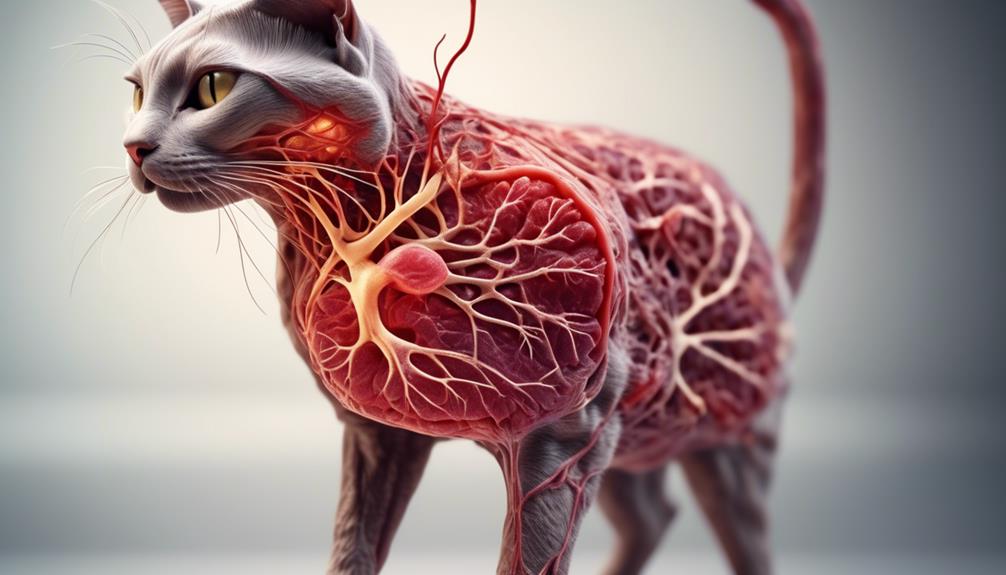The liver is a vital organ in feline physiology, playing a crucial role in various metabolic, detoxification, and immune functions. Understanding the intricate workings of the feline liver can provide valuable insights into maintaining overall feline health and addressing potential health concerns.
From the intricate structure of the liver to its multifaceted functions, exploring these key aspects can shed light on the intricacies of feline liver health and the importance of monitoring and supporting this essential organ.
Key Takeaways
- The liver is a vital organ in feline physiology, playing crucial roles in metabolic, detoxification, and immune functions.
- The feline liver is organized into hepatic lobules, with hepatocytes arranged in a hexagonal pattern. It is supplied with blood from the hepatic artery and portal vein, and the portal triads play a crucial role in supplying blood and nutrients for effective liver function.
- Maintaining liver health in cats is crucial for their overall well-being and longevity. Regular check-ups and blood tests are important for early detection and management of liver diseases, such as hepatic lipidosis.
- Preventing liver diseases in cats involves maintaining a healthy weight, providing a balanced diet to prevent hepatic lipidosis, educating cat owners about the significance of liver health, and regularly visiting the veterinarian to monitor liver enzyme levels for potential issues.
Liver Function in Cats
How does the liver function in felines, and what role does it play in maintaining their overall health and well-being?
The liver is an essential organ for feline health, performing a wide range of functions crucial for overall well-being.
One of its key roles is in processing nutrients from food and regulating metabolism, making it vital for a cat's dietary impact.
The liver also plays a significant part in disease prevention, as it is involved in detoxifying the blood, producing essential proteins, and storing vitamins and minerals necessary for immune function.
Furthermore, it aids in the prevention of various diseases by regulating glucose levels and lipid metabolism.
Additionally, the liver also contributes to the breakdown and elimination of toxins and drugs from the body, further emphasizing its role in disease prevention.
Therefore, understanding the liver's function in felines is crucial for ensuring their health and well-being, as it directly impacts their dietary impact and disease prevention.
Liver Structure in Cats
The intricate organization and composition of the liver in felines significantly contribute to its multifaceted role in maintaining their overall health and well-being, complementing its vital functions previously discussed.
The liver is structured into numerous microscopic functional units called hepatic lobules. Within these lobules, hepatocytes, the primary functional cells of the liver, are arranged in a hexagonal pattern around a central vein. This unique arrangement facilitates the efficient processing of blood and the metabolic functions of the liver.
Furthermore, the hepatic lobules are supplied with blood from two sources: the hepatic artery and the portal vein. At the periphery of each lobule, these blood vessels, along with the bile duct, form structures known as portal triads, which play a crucial role in supplying the lobules with oxygen-rich blood and nutrients while also carrying away waste products.
This organized structural arrangement ensures the effective performance of essential liver functions, such as detoxification, metabolism, and nutrient storage, thus supporting the overall well-being of felines.
Understanding the intricate liver structure in cats is imperative for veterinarians and researchers in diagnosing and treating various liver disorders to ensure the optimal health of feline patients.
Liver Health in Cats
Maintaining optimal liver health is crucial for the overall well-being and longevity of feline patients. Feline liver diseases, such as hepatic lipidosis, can significantly impact a cat's health. Hepatic lipidosis, also known as fatty liver disease, occurs when an excessive amount of fat accumulates in the liver, leading to liver dysfunction. Monitoring liver enzyme levels is essential in assessing liver health in cats. Elevated levels of liver enzymes, such as alanine transaminase (ALT) and aspartate transaminase (AST), may indicate liver damage or disease.
Regular check-ups and blood tests are important for early detection and management of feline liver diseases. Additionally, maintaining a healthy weight and providing a balanced diet can help prevent hepatic lipidosis and other liver-related conditions in cats. Educating cat owners about the significance of liver health and the importance of regular veterinary visits can contribute to the overall well-being of feline patients.
Frequently Asked Questions
Can Cats Survive Without a Functioning Liver?
Cats cannot survive without a functioning liver. Liver transplants are rare due to surgical challenges and availability. Survival rates are low. Liver regeneration is limited, and alternative treatments focus on managing symptoms and improving quality of life.
How Does Age Affect Feline Liver Function?
Age can impact feline liver function due to changes in metabolic processes and decreased regenerative capacity. Diet and exercise routine can influence liver health. Proper nutrition and regular physical activity can help support liver function in aging cats.
Are There Any Genetic Factors That Can Impact a Cat's Liver Health?
Genetic predisposition and dietary impact can significantly influence a cat's liver health. Certain genetic factors may predispose cats to liver conditions, while dietary choices can either support or strain liver function. Regular veterinary check-ups can help monitor and address these concerns.
What Are Some Common Signs of Liver Disease in Cats?
Signs of liver disease in cats include jaundice, weight loss, vomiting, and increased thirst. Treatment options depend on the underlying cause and may involve dietary changes, medications, or supportive care. Early detection is crucial.
Can Certain Medications or Supplements Affect a Cat's Liver Function?
Certain medications, such as anesthesia, and supplements can impact a cat's liver function. Additionally, dietary impact plays a crucial role. It's imperative for cat owners to consult with a veterinarian before administering any medications or supplements.


